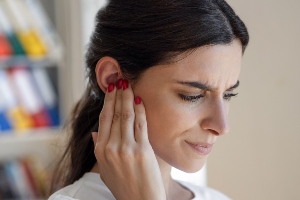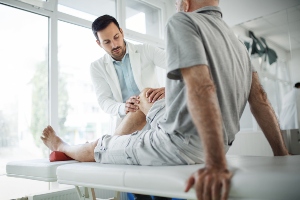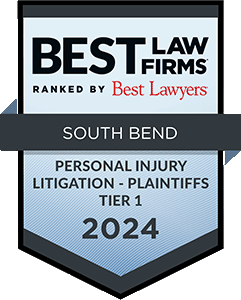Hearing loss after a car accident is often overlooked. Typically, this is because crash victims who experience hearing loss after a crash may not always be aware they suffered any harm.
Table of Contents
If you have suffered from hearing loss after a car crash, do not hesitate to seek counsel from a trusted lawyer. Our South Bend car accident attorneys may be able to help. We offer a free consultation to help you identify the next legal steps towards seeking compensation. During your consultation, you are not obligated to pay any fees unless we win your case.
Request a FREE case review today. (574) 444-0741.
How Can a Car Accident Cause Hearing Loss?

Car accidents create intense forces that can affect various parts of the body, including the ears. Hearing loss from a car accident may result for multiple reasons.
Direct Trauma
A direct blow to the ear or sudden pressure changes can tear the eardrum, leading to hearing loss. For instance, if the car’s airbag deploys, the sudden and intense pressure change can cause the eardrum to rupture.
Additionally, a direct blow to the head could happen if your head hits the steering wheel or side window. This kind of injury might not always be visible but can significantly impact your hearing.
Acoustic Trauma
A car accident often produces extremely loud noises that could exceed healthy noise levels. Sudden intense noise can damage the delicate parts of the inner ear responsible for picking up sound. This damage, called acoustic trauma, can cause hearing loss that develops suddenly or gradually over time.
Head Injuries
Concussions and other head injuries from a crash can interfere with the brain’s ability to process sound. Even if the ears are not injured, damage to the brain’s auditory pathways can impair hearing. This disruption can make it difficult for your brain to interpret sounds correctly, leading to hearing problems. These hearing problems could include difficulty understanding speech, muffled hearing or ear ringing.
How Do I Identify Signs of Hearing Loss After a Car Accident?
Car crash victims should know the signs of hearing loss for early diagnosis and treatment. Seek medical attention if you experience the following symptoms after a car accident.
- Difficulty hearing normal sounds: You may have trouble hearing conversations, television or other everyday sounds, indicating partial or complete hearing loss.
- Ringing in the ears: This is known as tinnitus, a condition that involves ringing in the ears, buzzing or hissing noises. Tinnitus often comes with hearing loss and may be a sign of damage to the hearing system.
- Sensitivity to noise: Experiencing discomfort or pain from previously tolerable sounds can signal damage to the inner ear structures or auditory nerves.
- Feeling of fullness in the ears: If your ears feel full or congested, it could indicate a problem with the middle ear or eardrum, potentially resulting from trauma.
- Balance issues: The inner ear is responsible for maintaining balance. If you experience dizziness or unsteadiness, it may be related to hearing loss or inner ear damage.
Diagnosis and Treatment for Hearing Loss
If you suspect hearing loss after a car accident, a thorough evaluation by a medical professional is essential. The process could involve:
- Medical Examination: A doctor will assess your overall health and check for physical damage to the ears. They may inquire about your symptoms and medical history.
- Audiometric Testing: An audiologist will conduct tests to measure your ability to hear sounds at different pitches and volumes.
- Imaging Studies: In some cases, imaging tests like CT scans or MRIs may be necessary to evaluate damage to the auditory structures or related areas of the brain.
Treatment for hearing loss depends on the underlying cause and severity. Options might include:
- Medication: If an infection or inflammation causes hearing loss, medications such as antibiotics or steroids may be prescribed.
- Surgery: For physical injuries to the ear or eardrum, surgical intervention might be needed to repair the damage.
- Hearing Aids: If hearing loss is permanent, hearing aids can help amplify sounds and improve communication.
How Can I Prevent Hearing Loss in a Car Accident?
While it’s impossible to eliminate the risk of car accidents, there are practical steps you can take to minimize the chances of being involved in car crashes that could damage your ears.
Wear Your Seatbelt
Seatbelts are designed to keep you securely in place, reducing the likelihood of being thrown around the vehicle or hitting parts of the car that could cause ear injury. Wear a seatbelt to reduce the impact on your head and ears.
Adjust Headrests
Ensure your headrest is adjusted correctly to support your head and neck. This can help reduce the risk of whiplash, which could cause damage to your inner ear.
Properly Maintain Your Vehicle
Maintain your brakes, tires, and airbags to ensure your car is in good working condition. Routine checks can help you avoid accidents that could lead to injuries.
Injured in a Car Accident? Call us today
Hearing loss resulting from a car accident is a severe condition that requires proper recovery. It is highly recommended that you seek legal counsel from a trusted lawyer who understands the legal process after a car accident.
At Pfeifer, Morgan and Stesiak, we understand how complex taking legal actions can be. We can determine if you have a case and help you take the next legal steps to advocate for your rights and pursue compensation.
Call us for a free consultation today: (574) 444-0741.











